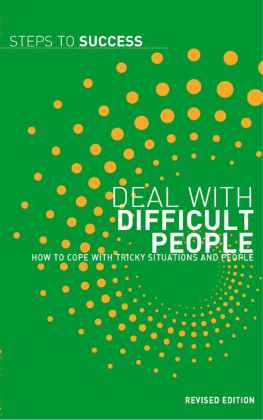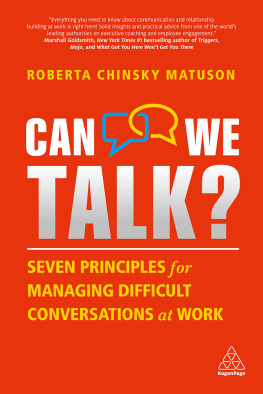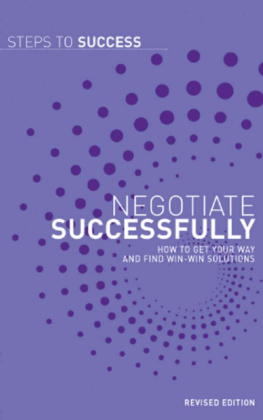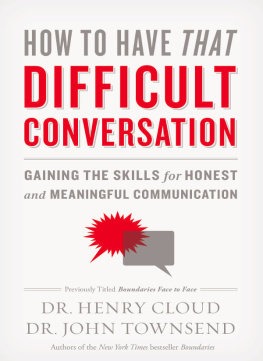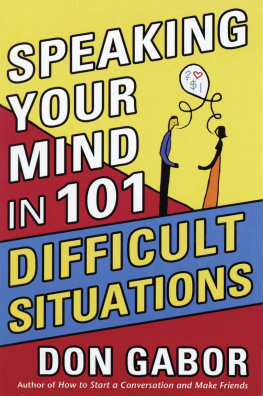Table of Contents
Guide
Pages
Lifescripts
What to Say to Get What You Want in Life's Toughest Situations
THIRD EDITION
Stephen M. Pollan and Mark Levine

Copyright 2019 by Mark Levine. All rights reserved.
Published by John Wiley & Sons, Inc., Hoboken, New Jersey.
Published simultaneously in Canada.
No part of this publication may be reproduced, stored in a retrieval system, or transmitted in any form or by any means, electronic, mechanical, photocopying, recording, scanning, or otherwise, except as permitted under Section 107 or 108 of the 1976 United States Copyright Act, without either the prior written permission of the Publisher, or authorization through payment of the appropriate percopy fee to the Copyright Clearance Center, Inc., 222 Rosewood Drive, Danvers, MA 01923, (978) 7508400, fax (978) 6468600, or on the Web at www.copyright.com. Requests to the Publisher for permission should be addressed to the Permissions Department, John Wiley & Sons, Inc., 111 River Street, Hoboken, NJ 07030, (201) 7486011, fax (201) 7486008, or online at www.wiley.com/go/permissions.
Limit of Liability/Disclaimer of Warranty: While the publisher and author have used their best efforts in preparing this book, they make no representations or warranties with respect to the accuracy or completeness of the contents of this book and specifically disclaim any implied warranties of merchantability or fitness for a particular purpose. No warranty may be created or extended by sales representatives or written sales materials. The advice and strategies contained herein may not be suitable for your situation. You should consult with a professional where appropriate. Neither the publisher nor author shall be liable for any loss of profit or any other commercial damages, including but not limited to special, incidental, consequential, or other damages.
For general information on our other products and services or for technical support, please contact our Customer Care Department within the United States at (800) 7622974, outside the United States at (317) 5723993, or fax (317) 5724002.
Wiley publishes in a variety of print and electronic formats and by printondemand. Some material included with standard print versions of this book may not be included in ebooks or in printondemand. If this book refers to media such as a CD or DVD that is not included in the version you purchased, you may download this material at http://booksupport.wiley.com. For more information about Wiley products, visit www.wiley.com.
Library of Congress CataloginginPublication Data is Available:
ISBN 9781119571971 (Paperback)
ISBN 9781119571933 (ePDF)
ISBN 9781119571964 (ePub)
Cover Design: Wiley
Cover Image: sanchesnet1/iStock.com
The enduring popularity of Lifescripts is a tribute to the continued relevance and power of the philosophy of Stephen M. Pollan. Stephen's combination of pragmatism and morality provided an approach to the business of living that was unique when he and I first began working together in the 1980s and remains unique today. Stephen cared for people in general and his individual clients specifically. He was a loving, wise, savvy man who strived to make the lives of other people better. He succeeded.
Mark Levine
ACKNOWLEDGMENTS
Lifescripts was originally published in 1996. At the time, few people thought that there was a market for a book that told people exactly what to say to get what they want in difficult conversations. However, Stuart Krichevsky of the Stuart Krichevsky Literary Agency believed in the project. Lifescripts is just one out of hundreds of confirmations of Stuart's wisdom. His knowledge of the publishing industry is only surpassed by his loyalty and humanity.
Over the years Lifescripts became a cottage industry, expanding into ever wider areas. That required gathering input from a number of insightful and savvy individuals: Michael Caplan, Jonathan Epps, Andrew Frothingham, Erik Kolbell, Deirdre Martin, William Martin, Nick Morrow, Allison Noel, Aldo Pascarella, and Roni Beth Tower. Joining that list of experts in this new edition is Frankie Martin, whose expertise on managing a multigenerational, multicultural, and gender diverse workforce is unsurpassed. Thanks to all of these experts who've helped Lifescripts remain a powerful tool to empower readers to get the most they can out of life.
INTRODUCTION
To get what you want in life's toughest dialogues you need to plan exactly what to say: You need to develop a lifescript. No one, no matter how eloquent or quick witted, can possibly be ready to instinctively deal with every difficult conversation that comes up in today's workplace. And the consequences of saying the wrong thing, even unintentionally, get more serious with every passing year. Poorly chosen words may not just mean you don't get what you want; they could put your career or company in danger.
The 109 lifescripts in this book have been chosen to address the most common problematic dialogues in today's workplace. Each lifescript begins with a general discussion of the strategy you should use in the dialogue, touching on the general outlines of how the conversation should go. Next will be descriptions of the attitude you should project, timing you should follow, and behavior you should exhibit to get what you want from the dialogue. Turn the page and you'll find a flowchart, which offers a plan for how the conversation should proceed, including an icebreaker if you'll be starting the dialogue. You'll find potential pitches and responses to every likely statement or question by the other person. You can use the exact words in the script, or you can adjust them to fit your own speaking style. After the script you'll find potential adaptations of the lifescript for other situations and a simple list of key points that can serve as a crib sheet for right before your conversation.
Lifescripts has remained a perennial bestseller not just because it's a collection of effective icebreakers, pitches, questions, answers, and retorts. It's a complete approach to effective oneonone communications you can apply to situations in the business of living, as well as business. There's no way any single book could cover every possible scenario you'll face in your career. Read through the lifescripts and you'll see they're the expression of a practical communications philosophy. Use them and over time you'll gradually absorb the philosophy and begin instinctively applying it to all your important oneonone conversations.
To speed up your adoption of the Lifescripts approach here's a brief outline of its core tenets.
A DIALOGUE REQUIRES A BACK AND FORTH VERBAL EXCHANGE
To persuade someone you need to engage in a back and forth exchange. Texts, emails, instant messages, and social media may have revolutionized business and personal communications, but none of them allow for a dialogue. They won't convince your supervisor to give you a salary increase, for example. That requires you to make your case and respond to your supervisor's questions and concerns.
Communication mediums that are onesided do have their place in a lifescript situation: They can allow you to make a point without contradiction or interruption. Emails, for example, are convenient and effective replacements for memos that could detail your argument before a dialogue or document your points afterwards. Texts can be an excellent way to reschedule a meeting or conversation.





